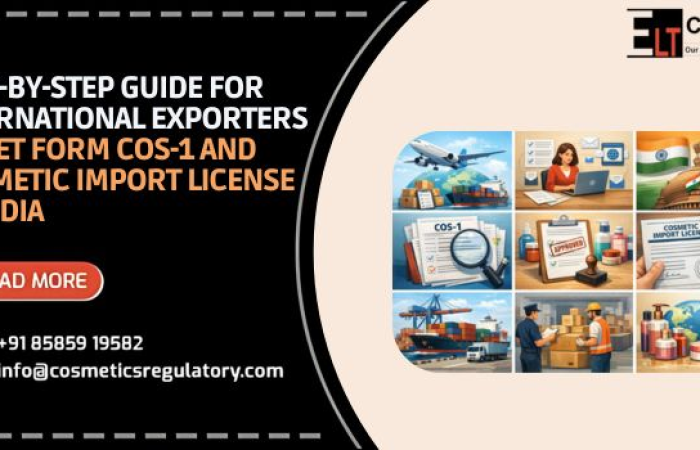Step-by-Step Guide for International Exporters to Get Form COS-1 and Cosmetic Import License in India

Great things in business are never done one. They're done by a team of people.
End to End Regulatory Support in
If you are running a business then you must know the crucial importance of ISO Certification for maintaining the standards of your organization. International Organization for Standardization (ISO) certification is a globally recognized seal of approval granted by an independent, third-party body, ensuring that a company meets the stringent international standard established by the ISO. It is a mark of excellence, achieving ISO certification not only enhances the credibility of business and trust among customers but also improves operational performance and gains a competitive edge in the global market.
The International Organization for Standardization (ISO) is an independent international organization that develops standards for a wide range of industries internationally. ISO is a group of national regulatory bodies of 167 countries with a single regulatory body representing each member country. It is governed by the members of an organization.
ISO Certification is mandatory for your company as it ensures the quality, safety and efficiency of both product and services. it helps in maintaining the standards of your brand and generates various ways for innovation and development of trade
ISO registration issued by the International Organization for Standardization provides various advantages to the company including being obedient to laws and regulations and ensuring the safety of employees and its customers. The various benefits ISO certification is as follows:
ISO-registered companies gain brand reputation and credibility faster than Non-ISO registered companies.
By improving the quality and safety of both product services.
ISO certification is valued worldwide, This enhances your business’s reputation and market value.
Adherence to quality standards draws more customers, keeping you competitive.
Defined processes, swiftly resolved issues, and upheld high standards.
Identifying waste and inefficiencies reduces scrap and overtime, lowering overall costs.
Enhanced quality and efficiency create avenues for the existing and new markets.
Data-driven decision-making leads to more effective management practices.
Problems are easily identified and resolved, reducing interruptions in operations.
Third-party audits offer fresh perspectives, helping to refine processes and address challenges.
There are around 21700 types of ISO registration certificates available in different domains across the world. Below are some ISO registration certificates relevant to the pharmaceutical industry:
However, the most common ISO registration types are ISO 14001 and ISO 9001.
The following documents required for ISO registration are:
The process of obtaining ISO certificate is described below:
Apply by submitting the application to ISO registrar, outlined by the responsibilities between your company and certification body.
ISO will review your documents manual and process to ensure its alignment with ISO standard.
Initial review will analyze any gaps in your quality management system (QMS).
Based on feedback create a plan to address the identified problems.
The ISO registrar conduct the onsite audit to check compliance with the ISO standard.
After resolving the major and minor problems the final audit is conducted.
After all the requirements are meet as per ISO standard, the registrar issues ISO certificate.
Apply by submitting the application to ISO registrar, outlined by the responsibilities between your company and certification body.
ISO will review your documents manual and process to ensure its alignment with ISO standard.
Initial review will analyze any gaps in your quality management system (QMS).
Based on feedback create a plan to address the identified problems.
The ISO registrar conduct the onsite audit to check compliance with the ISO standard.
After resolving the major and minor problems the final audit is conducted.
After all the requirements are meet as per ISO standard, the registrar issues ISO certificate.
ISO registration is crucial for a company, that is quality-conscious and wants to build its brand reputation. ISO registration is important for all companies who want to market their products. Company must work as per the rules and regulations govern that the company products are of quality standard. ISO registration provides companies with a certification for being obedient to laws and regulatory requirements. Therefore, enhancing the credibility and efficiency of products.
Below are the types of audits conducted under ISO certification:
Conducted by training staff, to ensure compliance within the organization.
Conducted by the lead auditor to check the suppliers are functioning correctly, ensuring consistency in high-quality supply of products to the organization.
Conducted by the certification body to ensure the process meets the ISO standard.
The timeline of obtaining an ISO certificate differs from Organization to organization depending on the expertise of the company and how it handles complexity. Also, the ISO certification body plays an important role in determining the time for each application.
The validity of the ISO certificate is three years from the date of issue.
The renewal process of an ISO certificate is a complex process that involves the organization’s consistency in adhering to ISO standards. ISO certificate is valid for a limited time period, quite sometimes it is three years. For renewal of the ISO certificate, the organization must go through the renewal process involving the recertification audit conducted by the certification body to renew the certificate.
The performed audit checks the ongoing compliance of the organization and meets ISO standards. Once it is verified, the renewal ISO certificate is issued from the certification body demonstrating the organization’s commitment in maintaining quality standards and reinforcing customer trust.
At ELT corporate, we leverage our expertise in the regulatory and legal departments to simplify the process of obtaining ISO registration certificates for our clients.
It depends on company which consultancy they choose. We at ELT corporate are quite efficient with the timely completion of the registration process.
It depends on the company or consultancy through which you are registering your organization. We ELT corporate provide service at a reasonable cost.










Adding {{itemName}} to cart
Added {{itemName}} to cart